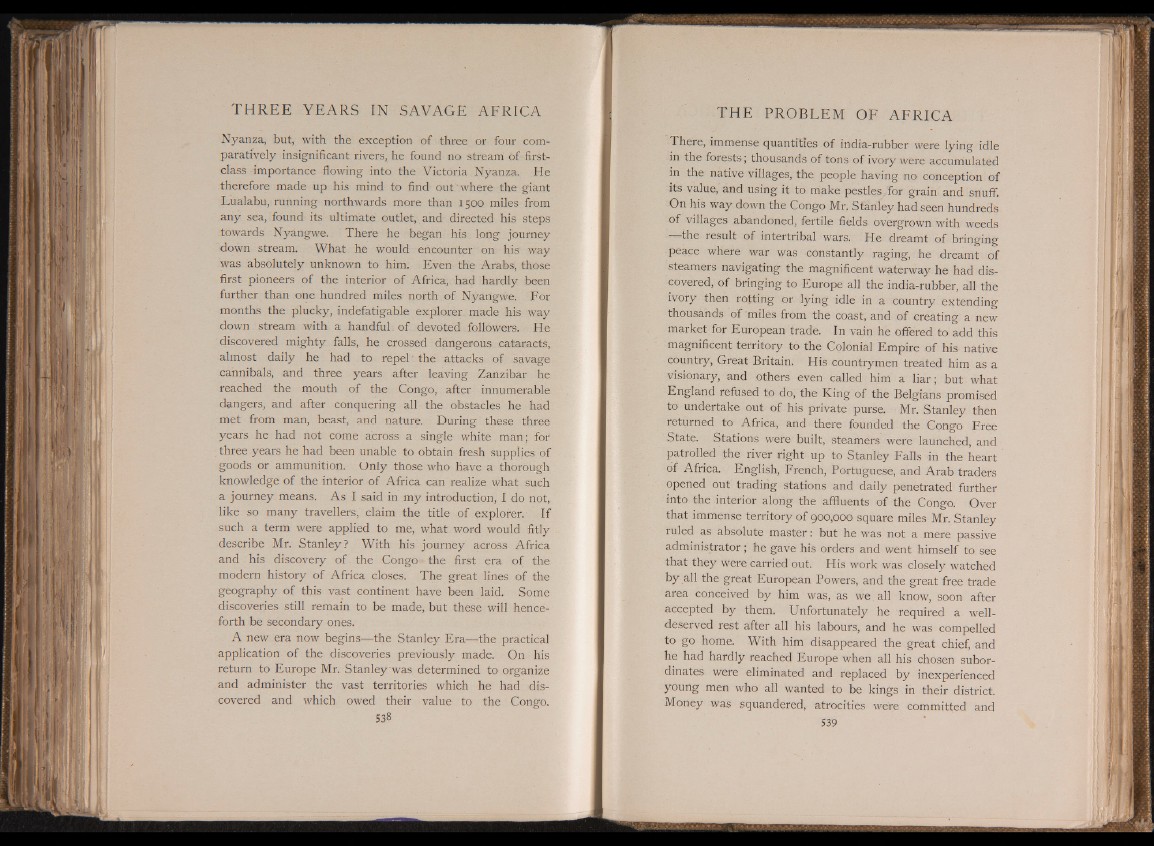
Nyanza, but, with the exception of three or four comparatively
insignificant rivers, he found no stream of first-
class-importance flowing into the Victoria Nyanza. He
therefore made up his mind to find out where the giant
Lualabu, running northwards more than 1500 miles from
any sea, found its ultimate outlet, and directed his steps
towards Nyangwe. There he began his long journey
down stream. What he would encounter on his way
was absolutely unknown to him. Even the Arabs, those
first pioneers of the interior of Africa, had hardly been
further than one hundred miles north of Nyangwe. For
months the plucky, indefatigable explorer made his way
down stream with a handful of devoted followers. He
discovered mighty falls, he crossed dangerous cataracts,
almost daily he had to repel the attacks of savage
cannibals, and three years after leaving Zanzibar he
reached the mouth of the Congo, after innumerable
dangers, and after conquering all the obstacles he had
met from man, beast, and nature. During these three
years he had not come across a single white man; for
three years he had been unable to obtain fresh supplies of
goods or ammunition. Only those who have a thorough
knowledge of the interior of Africa can realize what such
a journey means. As I said in my introduction, I do not,
like so many travellers, claim the title of explorer. If
such a term were applied to me, what word would fitly
describe Mr. Stanley? With his journey across Africa
and his discovery of the Congo the first era of the
modern history of Africa closes. The great lines of the
geography of this vast continent have been laid. Some
discoveries still remain to be made, but these will henceforth
be secondary ones.
A new era now begins—the Stanley Era—the practical
application of the discoveries previously made. On his
return to Europe Mr. Stanley was determined to organize
and administer the vast territories which he had discovered
and which owed their value to the Congo.
538
There, immense quantities of india-rubber were lying idle
in the forests, thousands of tons of ivory were accumulated
in the native villages, the people having no conception of
its value, and using it to make pestles for grain and snuff.
On his way down the Congo Mr. Stanley had seen hundreds
of villages abandoned, fertile fields overgrown with weeds
—the result of intertribal wars. He dreamt of bringing
peace where war was constantly raging, he dreamt of
steamers navigating the magnificent waterway he had discovered,
of bringing to Europe all the india-rubber, all the
ivory then rotting or lying idle in a country extending
thousands of miles from the coast, and of creating a new
market for European trade. In vain he offered to add this
magnificent territory to the Colonial Empire of his native
country, Great Britain. His countrymen treated him as a
visionary, and others even called him a liar; but what
England refused to do, the King of the Belgians promised
to undertake out of his private purse. Mr. Stanley then
returned to Africa, and there founded the Congo Free
State. Stations were built, steamers were launched, and
patrolled the river right up to Stanley Falls in the heart
of Africa. English, French, Portuguese, and Arab traders
opened out trading stations and daily penetrated further
into the interior along the affluents of the Congo. Over
that immense territory of 900,000 square miles Mr. Stanley
ruled as absolute master: but he was not a mere passive
administrator; he gave his orders and went himself to see
that they were carried out. His work was closely watched
by all the great European Powers, and the great free trade
area conceived by him was, as we all know, soon after
accepted by them. Unfortunately he required a well-
deserved rest after all his labours, and he was compelled
to go home. With him disappeared the great chief, and
he had hardly reached Europe when all his chosen subordinates
were eliminated and replaced by inexperienced
young men who all wanted to be kings in their district.
Money was squandered, atrocities were committed and
S39